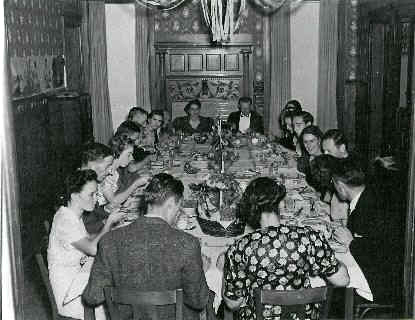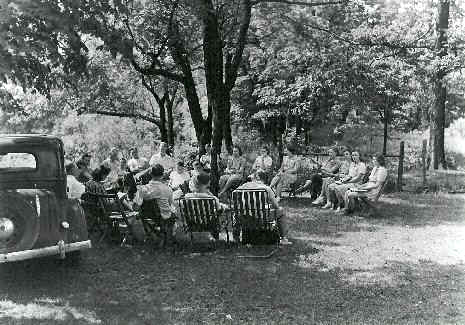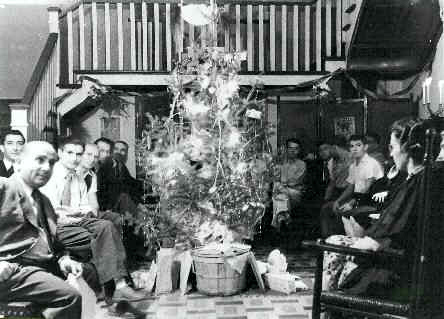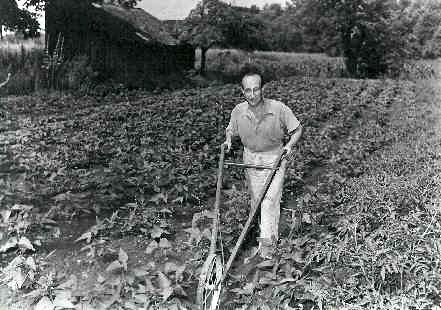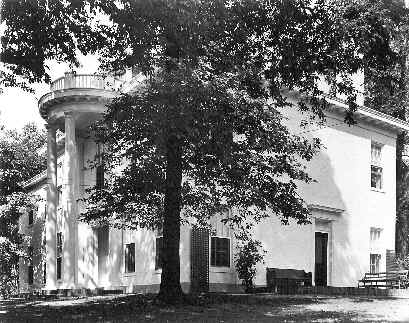 Quaker
Hill, 1940-41 Quaker
Hill, 1940-41
Although modeled on the hostel at Scattergood, the Friends-operated refugee
center at Quaker Hill differed in key ways from the prototype upon which it
was based. Sheltered in a large, white-pillared house donated by a wealthy
Quaker manufacturer, the hostel was located in Richmond, Indiana--a Midwest
town of 33,000 with a large Quaker heritage and population, as well as home
to Earlham, a small Friends college. Much more so than rural Iowa, Richmond
suggested the milieu typical of the industrialized, relatively densely
populated Lower Midwest stretching from the Mississippi to the headwaters of
the Ohio. There, American Friends Service Committee [AFSC] and volunteer staff who organized Quaker Hill hoped to
more easily and fully integrate that project into its surrounding community.
Undertaken at the urgent request of Jewish organizations and
others working with refugees, Quaker Hill operated on the assumption that a
group of people unknown to each other before might learn to live together
and work
cooperatively
in peace and harmony. The housekeeping, care of the grounds and buildings
are shared by all. In addition, all members of the group contributed three
hours of work daily-hard physical work-to the hostel. Thus, a sound
balance between mental and physical activity was sought.<1>
In contrast to the site on the wind-swept Iowa prairies, in the rolling
South-Indiana woods AFSC hoped to place more refugees directly into
industrial positions. Located almost equidistant between Cincinnati and
Indianapolis, Richmond's 55 manufacturing facilities employed some 4,000
people and produced a diverse assortment of lawn mowers, school bus bodies,
metal castings, caskets, farm implements, etc. While occupation retraining
per se was not offered, the philanthropist who had given the hostel site to
AFSC also made provisions for some of the refugees to work at an adjoining
four-story oil mill for refugees with business experience
around whom
could be developed one or more small business enterprises, which would
employ other refugees [or facilitate] some project like putting together
pre-fabricated houses...in connection with the city of Richmond and also
the U.S. Government.<2>
Quaker Hill's overseers intended not just the mill to be a vehicle for default
occupational therapy, but--like at Scattergood--that the reconstruction of the
site<3> itself would offer an
opportunity
for the work element found to be desirable in the daily program of [a]
Refugee Hostel, as well as the [focus of a] program of the Peace Camp and
similar activities for young Friends. A competent foreman [was] secured to
direct this work of reconditioning who [could] use tactfully and helpfully
the service of these people.<4>
The work
component of Quaker Hill, however, often ran better than the educational one
at the hostel. Mary Lane Charles--who had volunteered at Scattergood until
she transferred to Quaker Hill--reported the Richmond site had endeavored to
"fulfill the refugees' need for English in as large a variety of ways
as possible". The backbone of the program had been individual tutoring
and classes, but the "chief demand" remained that of instruction
in English grammar, vocabulary and pronunciation. Although the mostly young
Quaker volunteers at the hostel frequently offered subjects such
as American history, sociology or geography, Charles reported: "our
efforts met with little response, except for a class in American literature,
given once a week by a teacher from Richmond". During most of the year
the staff held two classes daily-one for those with "slight knowledge
of English" and one for advanced pupils. Twice a week students from
Earlham College's Speech Department visited to give individual phonetics
lessons. In addition, refugees were entitled to an hour's tutoring a day if
so desired and "most of the residents took advantage of this
opportunity". The staff even organized a special table for beginners presided over by one of the Civilian Public Service
volunteers at Quaker Hill. Various staff shared the responsibility for being
available
for
conversation in the parlor in the evenings. During several months short
current events talks were given after dinner by residents and occasionally
by staff-members. This was finally given up on the request of the
residents, as many of them were distressed at having to dwell on war news.<5>
The hostel did sponsor a series of panel discussions focused on
"subjects of current interest", such as "Economic Causes of
the Present War" or a review of "American and European
Etiquette". Frequent public-speaking appearances and the writing of
articles for local newspapers gave refugees practice in using English skills
they were developing at Quaker Hill. Staff encouraged residents to attend
lectures or other programs both at Earlham College and at Quaker Hill
itself. The hostel held over 30 lectures, often "by someone from
Richmond" on aspects American life such as the educational system,
journalism in the U.S. or "illustrated travel talks on some region of
America". At other times visiting Friends talked about Quaker relief or
reform work and gave news of conditions in Europe. In a more informal mode,
the staff also hosted teas to which Richmondites were invited--
most of
which included a talk by an American guest, usually an Earlham professor,
on subjects such as Quakerism, American music, etc... Richmond friends
cooperated generously in inviting residents to their homes for tea or
dinner and introducing them to other Americans of similar interests.<6>
If it were not perfect, Quaker Hill's program at least earned praise at
least from the New York German-language Jewish newspaper, Der
Aufbau, which claimed that refugees who had found a haven at
Quaker Hill could
plan in
peace and safety, under experienced leadership, a new life... Reinforced
in soul and body with new confidence in the future, these new Americans
have found a new field of working.<7>
The Aufbau's
claim was not exaggerated, as examples of refugee placements secured through
Quaker Hill abound. To list a few: doctor Alex Szittya became a resident
physician at a general hospital in Chester, Pennsylvania. Johann Suskind
located a sales job and drove a delivery van in Indianapolis. Friedrich
Schweiger was appointed foreman at company in Evansville, Illinois--while
Franz Foges also found employment in that Chicago suburb. Walter Ellinger
landed a job at a Cincinnati cookie factory and Gus Ferl a job in
Indianapolis. In a less laborious vein, Norbert Silbiger had "a very
successful year" directing plays at Richmond's Civic Theater and
Earlham College.<8>
Quaker Hill operated from July 1940 till September 1941, at which point it
closed "due to immigration restrictions". As its own last report
assessed, the hostel had given the 55 refugees--"victims of Europe's
terror"--who sojourned there during that time "a chance to find
themselves, and to become adjusted and ready for American life and
citizenship".<9>
Quaker
Refugee Projects:
Agricultural
Projects | Boarding Schools | Rest
Homes | Hostels
Footnotes
|
<1>
|
Undated, unsigned broadsheet, "Quaker Hill as a Hostel for
Refugees".
|
|
<2>
|
Isaac Woodward, Letter to John Rich, 20.XI.40.
|
|
<3>
|
The site consisted of the main house, a shop, a new CPS-built frame
dormitory and an assembly building, situation on 25 acres "of
beautiful grounds and gardens [which] add to its charm and
usefulness" (Isaac Woodward and Millard Markle, Report titled
"Quaker Hill: A Friends Service Center", 1.I.42 .
|
|
<4>
|
Murry Kenworthy and Frances Doan Streightoff, Report titled
"Meeting of the Friends Peace Camp Project, held at Richmond,
Ind., March 14, 1940".
|
|
<5>
|
Mary Lane Charles, Undated report titled "The Educational
Program at Quaker Hill".
|
|
<6>
|
Ibid.
|
|
<7>
|
"Quaker Hostels", a previously translated article from
Der Aufbau, 21.II.41.
|
|
<8>
|
Quaker Hill's monthly newsletter, The Quaker Hill Post, August
1942.
|
|
<9>
|
Isaac Woodward and Millard Markle, Report titled "Quaker Hill:
A Friends Service Center", 1.I.42.
|
|
| | | | | | | |
| Home |
|


